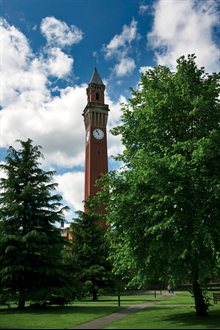- PhD Electronic Engineering
- Managing Director, Enotrac UK Ltd
Duration – 6:34
My name is Ziad Mouneimne. I graduated here first in 1980, as an undergraduate in electrical engineering. Then I stayed on to do a PhD, graduating in 1984, also in electrical engineering. I’m presently, managing director of a consultancy company called Enotrac UK Ltd, which is a Swiss and a British Company.
Q1 – How did your time at the University shape and influence you?
A1 – With engineering, you are learning a lot of facts, you are learning the analytical skills, and doing a PhD helps you to go deeper into the technical details, and gives you time to think, and do your own thing as it were, right at an early age. And it helped me throughout my career, I mean I am Managing Director at the moment, in terms of running the company, I’m also Technical Director because I kept on the Technical side of things and my PhD has definitely helped me with that.
Q2 – Why do a PhD at Birmingham?
A2 – It’s a combination of things really. I was very interested in the subject that I did in my third year as a project. The subject was looking at energy saving on railways, and when I came to graduate I thought about going into industry at first. In fact I did start doing some training in industry and I thought, no, I’d like to come back and do a PhD. I felt the support was great from the department where I was. I liked the people who were proposing the project and I got sponsored by a company; GEC in Stafford, to whom I’m still grateful to to this day for the support they gave me. I was supported by my supervisors then; Professor Brian Mellit and Dr Colin Goodman. Colin is still here and I’m still in contact with him. Yeah, I made the right choice
Q3 – How has having a PhD helped your career?
A3 – Well in the PhD you have time to really go into the fundamentals to understand the subject properly. The fundamentals are important in whatever you do, you apply some principals that if you don’t get right throughout your career, then I think you’re on shaky ground. But the PhD gives you a very solid grounding, particularly if you want to specialize in a particular area, which I did. I’m not saying everybody should specialize, by no means, but the subject that I concentrated on during my PhD, fortunately the way it worked out, maybe I was lucky, it’s still very important now. Even today we are talking about energy saving on the railways. The railway field is my field now.
There is also the personal aspect, I don’t know if you are going to ask me about that later on, but you spend time with people doing the research. You spend 3 years with people that you tend to get to know very very well. And in fact they are my best friends still today, and I’m talking nearly 30 years ago that I graduated with a PhD and I still have many many friends from the time that I was at university doing research.
Q4 – What would you say to a student who is thinking of doing a PhD?
A4 – That’s a difficult question because it depends if you are after just money or if you are after the satisfaction. Maybe if it’s after pure money… I don’t know, it depends if you get paid during the PhD or not. But if you leave the money side apart, I think from the technical point of view, yes it helps you. If you want to stay in a technical career, and there are many fascinating aspects in a technical career, meaning not just managerial work. If you want to stay as a technical authority in an important position, I think that a PhD is a help. You’ve got to be the right person, I’m not saying that everybody should do it, or can do it, or is suitable for being PhD material. You’ve got to be good at persevering, shall we say…I mean I remember working until 3 o’clock in the morning, but that was because we had one mainframe computer, and there was a lot of competition to use the computing facilities. Nowadays of course everybody has his own computer, probably one PC is more powerful than the computer we had in those days for the whole university. But even so, you’ve got to have some determination, because it can be tough, particularly when you have a problem and you can’t get over it. You have to burn some midnight oil shall we say. You have to be prepared for that.
Of course, when you are an Undergraduate you are still early in life. When you are a postgraduate you’ve matured, just by virtue of age and you start thinking also about your personal life, and as it happens, I met my wife here at the University during my postgraduate years, and yeah, we are happy together. And funnily enough, my elder brother came to Birmingham before me. He did Civil Engineering BSc and MSc, and today my son is here at the university in the first year in Economics, so it runs in the family a bit, and I have a great attachment to the place still. I have been a few times, and as I said, the people you spend time with during a PhD they become your personal friends. You talk all the time on the phone and by email…yeah, you make some fantastic friends who will stay with you for life, and I think that is very very important, probably even more important than the technical stuff that you learn during your PhD.
